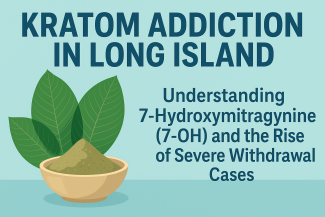Kratom Addiction in Long Island: Understanding 7-Hydroxymitragynine (7-OH) and the Rise of Severe Withdrawal Cases

Kratom Addiction in Long Island: Understanding 7-Hydroxymitragynine (7-OH) and the Rise of Severe Withdrawal Cases
By Benjamin Zohar, NCACIP
Moderator – ISSUP Network #447 (7-Hydroxymitragynine / Kratom Discussion)
What Is Kratom and 7-OH
Kratom (Mitragyna speciosa) is a Southeast Asian plant with both stimulant and sedative effects.
Its potent alkaloid 7-hydroxymitragynine (7-OH) binds to the same opioid receptors affected by heroin, fentanyl, and prescription painkillers.
While the natural leaf contains trace 7-OH levels, today’s concentrated kratom extracts deliver opioid-level potency and can lead to tolerance, dependence, and severe withdrawal.
A Growing Crisis in New York Detox Centers
Across New York State—especially Long Island—patients are appearing in detox units with kratom withdrawal syndromes resembling or exceeding traditional opioid withdrawal.
Clinicians report symptoms such as intense body aches, tremors, insomnia, anxiety, vomiting, and dehydration.
Several patients describe the process as “worse than heroin or fentanyl.”
Many are former opioid users who believed kratom was a safe, legal alternative because it was sold in gas stations and vape shops.
When New York and Suffolk County tightened regulations—banning sales to minors and targeting high-potency extracts—dependence forced users to seek treatment or resort to extreme measures to maintain the habit.
Law and Regulation in Suffolk County and Beyond
Under Suffolk County Local Law No. 37-2016, Article VIII of Chapter 423 (Sale of Kratom) prohibits selling or distributing kratom to anyone under 21 (§423-46 – §423-47).
Violations carry fines or potential jail time.
Nationally, the U.S. Food and Drug Administration (2025) recommended classifying 7-OH under the Controlled Substances Act, citing its high abuse potential and lack of approved medical use.
Why Withdrawal Can Be So Severe
7-OH activates opioid pathways without the medical supervision or dosing controls of prescription opioids.
When stopped suddenly, users experience rapid dopamine and endorphin crashes that produce both physical and psychological pain.
Kratom withdrawal often includes mixed stimulant-sedative effects, making symptoms unpredictable and occasionally prolonged.
Seeking Help in Long Island and New York
Treatment for kratom dependence follows evidence-based opioid-use-disorder protocols. The first step is a medically supervised detox, where clinicians manage acute withdrawal symptoms and evaluate the need for medication-assisted treatment (MAT).
In most cases, patients experiencing significant withdrawal or craving are prescribed a taper using Suboxone® (buprenorphine/naloxone) or Subutex® (buprenorphine-only). These medications reduce withdrawal intensity, prevent relapse, and allow individuals to stabilize physically before transitioning into therapy and recovery.
Many patients choose to continue MAT long-term under physician supervision, while others taper off gradually once stable. The approach depends on each person’s medical history, substance-use pattern, and recovery goals.
- Medically Supervised Detox – safe management of acute withdrawal.
- Behavioral Therapy and Counseling – addressing triggers and mental-health co-occurrences.
- Medication-Assisted Support or Gradual Taper – individualized and physician-monitored.
- Long-Term Recovery Planning – community, peer, and family engagement.
Residents can reach out to Long Island Addiction Treatment Resources for confidential assessments and referral to licensed detox and rehabilitation programs.
Additionally, Integrity Treatment Partners is a recognized outpatient facility offering ongoing care and support for individuals in recovery.
Programs & Treatments Available
Below are examples of programs and treatment modalities available through Long Island Addiction Treatment Resources’ network:
<
- Long Island Medication-Assisted Treatment Programs
- Long Island Inpatient Rehab Programs
- Long Island Outpatient Treatment Services
- Long Island Kratom Treatment & Recovery Options
References
- Suffolk County, NY – Article VIII: Sale of Kratom, Chapter 423, Drugs and Drug Products. eCode360
- U.S. Food and Drug Administration (2025). FDA Takes Steps to Restrict 7-OH Opioid Products Threatening American Consumers.
- International Society of Substance Use Professionals (ISSUP) – Network #447 (7-OH / Kratom Discussion).